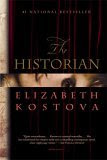 Despair Has Its Own Calm
Despair Has Its Own CalmThe Historian
Elizabeth Kostova
Little Brown
Looking back over the past few entries, I realize that I've been in a tremendous rut. Please accept my sincere apologies for boring you all to death with formulaic, lame and often insipid writing. I can offer no excuses. Hopefully this week's post won't suck. (Read on kids ... pun definitely intended.)
The Historian is an intricate, well-crafted novel that is, on one level, a modern reworking of the Dracula myth. At the beginning of the story, we are introduced to the narrator who, as a young girl, discovered a mysterious vellum-bound book in her father's library . Overcome by curiosity, she approaches her parent and asks about the book's history. At first, her father is reluctant to discuss it -- but she persists and eventually he shares the book's tale. The story is so horrific -- so dangerous, in fact -- that the father can only relate it in bits and pieces and it is over the course of a few years that the narrator learns that the book is tied to a great evil -- Vlad Ţepeş of Wallachia. Vlad, it seems, is still alive and the narrator's father is on a quest to find Dracula and to figure out a way to kill him.
On another level, the novel is really about the idea of history and how cultural, social, political and even religious narratives impact our present and future lives. This novel is rich in historical detail and I learned quite a great deal about both medieval and cold war Eastern Europe. I also received an important lesson in early Western/Islamic relations. Reading The Historian has encouraged me to do some research on the Ottoman Empire, the fall of Constantinople, and the blend of Eastern/Western cultures in Turkey, Bulgaria and Hungary. Any novel that makes you want to read history doesn't suck ... even if it is about Dracula. Four impaled Wallachians out of five.
Elizabeth Kostova
Little Brown
Looking back over the past few entries, I realize that I've been in a tremendous rut. Please accept my sincere apologies for boring you all to death with formulaic, lame and often insipid writing. I can offer no excuses. Hopefully this week's post won't suck. (Read on kids ... pun definitely intended.)
The Historian is an intricate, well-crafted novel that is, on one level, a modern reworking of the Dracula myth. At the beginning of the story, we are introduced to the narrator who, as a young girl, discovered a mysterious vellum-bound book in her father's library . Overcome by curiosity, she approaches her parent and asks about the book's history. At first, her father is reluctant to discuss it -- but she persists and eventually he shares the book's tale. The story is so horrific -- so dangerous, in fact -- that the father can only relate it in bits and pieces and it is over the course of a few years that the narrator learns that the book is tied to a great evil -- Vlad Ţepeş of Wallachia. Vlad, it seems, is still alive and the narrator's father is on a quest to find Dracula and to figure out a way to kill him.
On another level, the novel is really about the idea of history and how cultural, social, political and even religious narratives impact our present and future lives. This novel is rich in historical detail and I learned quite a great deal about both medieval and cold war Eastern Europe. I also received an important lesson in early Western/Islamic relations. Reading The Historian has encouraged me to do some research on the Ottoman Empire, the fall of Constantinople, and the blend of Eastern/Western cultures in Turkey, Bulgaria and Hungary. Any novel that makes you want to read history doesn't suck ... even if it is about Dracula. Four impaled Wallachians out of five.

